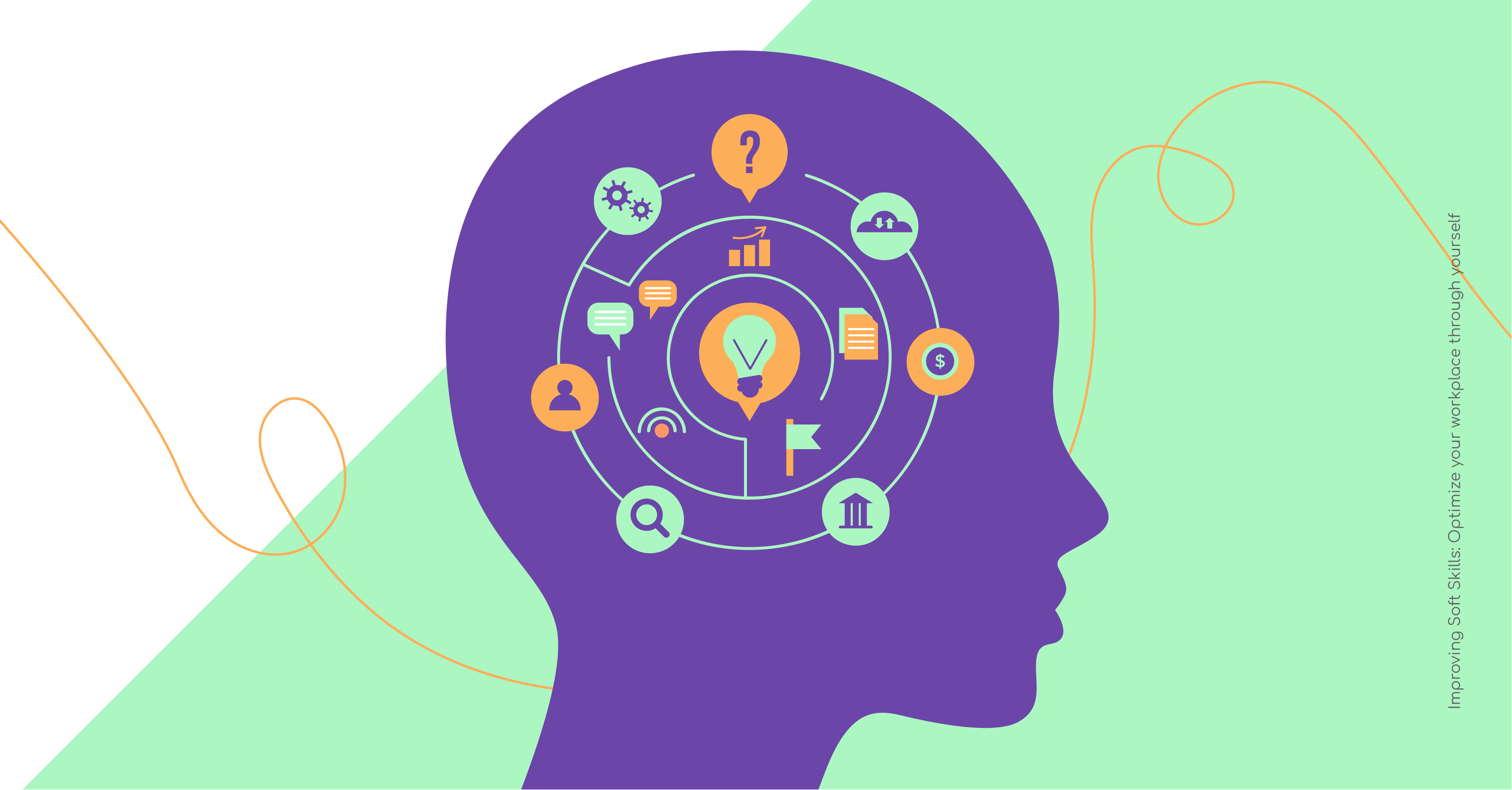Improving Soft Skills: Optimize your workplace through yourself
Author: Kostas Papanikolaou
Categories: Self-Development
Improving Soft Skills: Optimize your workplace through yourself
In previous blogs, we have extensively discussed the importance of communication among human beings when it comes to achieving evolution, technology advancement, and more. Most notably, we have discussed how communication has evolved throughout the millennia, currently being expressed via the best UX practices available out there, and constantly evolving to optimize how everyday life operates on a global scale. Improving soft skills is one of the most effective ways to achieve that.
There is no doubt that establishing good communication is the first step to achieve anything that requires a team to be built and supported. That need for optimized communication, combined with the growing popularity of remote work -among others due to the COVID-19 pandemic that started in early 2020- has made Soft Skills one of the most important sets of skills an employee can have nowadays.
Developing and improving soft skills will guarantee an optimized and effective workplace, inside which people will thrive, evolve, and produce the best possible results a team can bring. Not only that, but employee happiness can rise to great levels, bringing forth optimized productivity, solely thanks to employees improving their Soft Skills and bringing them in sync with everyone else’s. To achieve that, one has to follow the learning pattern that has been proven to be the most effective one:
- Learn
- Understand
- Implement
- Evolve
By following these four basic pillars of learning, combined with dedication and drive, anyone can pretty much learn, understand and implement any set of skills within the human species’ abilities. As a result, this is the pattern one can follow to get help into improving soft skills, leading to an optimized workplace, and therefore, to great results for one’s company.
What are Soft Skills?
First and foremost, Soft Skills are not technical. They relate to how an employee works, including their interaction with their colleagues, the thought process they follow to solve issues, how they manage their workload and time, how they resolve conflicts, and how creative they are.
Since remote work has become the norm throughout the duration of the COVID-19 pandemic, more and more companies have started investing in people that have improved Soft Skills, noticing that these assets make an employee more productive (both in terms of quality and quantity), and therefore more successful. This is why many companies have begun looking for candidates with improved soft skills.
An employee with advanced technical skills and/or an expert in a field that is very specific should not be evaluated solely based on their soft skills, even if they appear to not have improved soft skills. Contrary to popular belief, it takes less time and much less technical knowledge to improve soft skills than to elevate your technical skills in a short period of time
When trying to list soft skills, a thing or two are bound to be missed, while others are heavily focused. Soft skills are -in truth- all the skills that a person is required to have to be able to operate with little to no obstacles within their society. Therefore, how soft skills are interpreted and expressed may differ from one culture to another, however, they are always based on the same principles.
The following list is a basic foundation that anyone can use to get an idea of which skills are soft skills:
- Adaptability
- Communication
- Conflict resolution
- Creative thinking
- Critical thinking
- Dependability
- Motivation
- Positivity
- Problem-solving
- Teamwork
- Time management
- Work ethic
Improving Soft Skills is to Evolve
For anyone to improve anything, they first have to get their “hands” on it. Like with hard skills/technical skills, soft skills can be achieved with self-improvement and by working alongside people one trusts to obtain a soft skill that they do not possess. Only after someone has grasped the concept of a soft skill they will be able to improve it, making both their personal and professional lives better on every level one can think of.
Above, we mentioned that contrary to what most people tend to believe and promote, soft skills are actually easier to obtain than advanced technical skills. The latter require heavy reading, training, quite often extreme commitment, and a substantial amount of time to be perfected.
On the other hand, soft skills are directly related to communication and collaboration with others and are therefore much easier to practice on a daily level, outside or even within one’s workplace. Needless to say, getting and improving soft skills is not an easy task, however, its theoretical, non-tangible nature allows us to train ourselves into obtaining them more often.
Spending quality time with a family member or a friend, discussing personal issues that each party is currently facing, and trying to find solutions to these issues, is one of many ways a person has to both get and improve soft skills, staying in their comfort zone while doing it
In truth, any person who has entered society has worked, gone shopping, done house chores, have a pet, an intimate relationship, a group of friends, and an active relationship with their family is a person that has at least some of the aforementioned soft skills in their “arsenal”. Whether these are improved enough to make that person thrive in a workplace or not, it is a matter of how much they have invested in improving them.
It takes (easy) practice
At this point, we have established which skills are considered soft skills and why improving soft skills can be an easy task, despite being considered quite complex. We have also pointed out “why” improving soft skills is important since it has been proven time and time again that workplaces whose employees are improving soft skills can bring forth great results thanks to the optimized environment their employees have established. What remains to be answered, is the most difficult question of all: how?
Ask for feedback
Defining how someone can improve soft skills is a task that first requires the person in question to pinpoint which of their soft skills they need to work on. Asking for feedback from colleagues, employers, friends, family, and partners is a great way of finding out which soft skills you can improve. During that process of receiving and analyzing feedback, one can also understand how to improve these soft skills, provided they understand the feedback they have received.
Getting feedback from others is one of the most important steps towards improving soft skills, and even those who have a good set of soft skills available should always ask as well as provide feedback, improving their overall relationship with others
Practice in your comfort zone
No one can stress the importance of improving soft skills within one’s comfort zone enough. Despite comfort zones being a space considered “too safe” for communication-related practices, since it involves people that you are already familiar with and can guess their reactions or be aware of their beliefs, practicing and improving soft skills in your comfort zone is fundamental. Not only it allows you to take time and perfect behaviors, but it is guaranteed to offer insight into your relationship with the people most important to you, which can only lead to good things for all parties involved.
Within your comfort zone, you can practice with friends and family about virtually anything, from how to handle certain colleagues and their ways of communication, to playing out scenarios that help you train your negotiating soft skills and receiving feedback on how you did from someone you trust 100%
Self-reflect and self-analyze
It is no secret that overanalyzing can lead people to wrong conclusions, and may put their relationships with others in danger. To avoid overanalyzing every piece of information you receive, while improving soft skills, you should strive for self-reflection and self-analyzing instead. Take mental notes on interactions with others and instead of overanalyzing what you said, how you said, and/or what you SHOULD have said, try to analyze “why” you said something and keep notes on what alternatives you can use in the future.
Self-reflection and self-analysis can be tricky and despite looking easy-to-do, they require heavy investment to return substantial results. We encourage anyone who finds themselves in a rough spot to seek assistance, professional or from a friend, to get help into finding out more about themselves and their behavior. There is no shame in seeking self-improvement
Quick Soft Skills Tips
- Make eye contact when communicating. Try practicing in front of a mirror, it has great results
- Listen actively instead of just hearing, since paying attention will help you in improving soft skills by seeing what others do that you don’t
- Always remind yourself that we are all equal and can all be socially active without feeling uneasy or unsettled
- Ask and receive feedback not only for things that need improvement but also for things that you do well
- Provide feedback to others and recognize their contribution to the team, empowering both them and yourself for recognizing a peer
- Share your thoughts in a civilized, yet punctual manner, so that everyone knows what you mean
Tags: Communication, Employee, Improving Soft Skills, Soft Skills, Teamwork, Time Management, Work Ethic, Workplace










Latest Posts